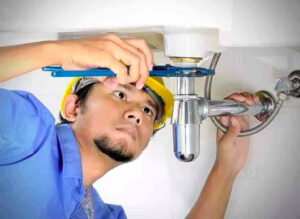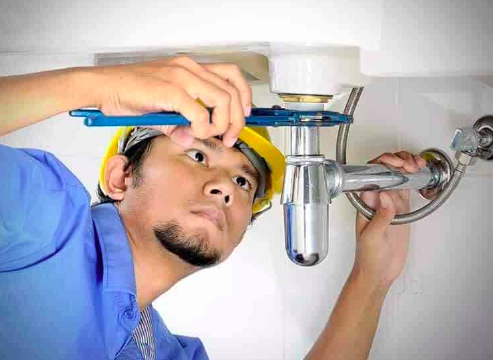Plumber installs and repairs the pipes that carry water, gas, and waste to and from homes and businesses. They also work with features like sinks, toilets, and water heaters. They interpret blueprints and building codes to lay out pipe systems and collaborate with architects and construction teams to incorporate plumbing into new buildings. Plumbers must be comfortable working in confined spaces and with tools.
Plumbers install pipes and fixtures that facilitate water, sewage, gas, and waste disposal in residential and commercial buildings. They must know building codes and regulations to install plumbing systems properly. They may also be responsible for obtaining permits and inspections. Plumbers use various tools to perform their job, including augers and snakes to unclog drains and hydro jets to clean sewer lines. They also install and repair appliances such as dishwashers and water heaters.
New construction plumbing is one of the most important jobs for plumbers. During this process, they follow blueprints to lay out the location of pipes and fixtures. This involves cutting through walls and floors to create space for the new system, as well as ensuring that all pipes connect correctly and are secure. Plumbers also install cisterns for toilets and sinks, and make sure all fixtures meet health and safety standards.
In the rough in phase of new plumbing, a plumber sets up all of the pipes before the drywall is put up. They take measurements and mark the locations for all faucets, shower heads, drains and water heaters. This ensures that the pipes are in the right place and that all of the necessary parts are available to finish the job when they come back.
Plumbing is a trade that requires a lot of on-the-job training. Most plumbers learn through an apprenticeship program sponsored by a union or trade organization. This usually lasts four to five years and includes a combination of classroom instruction and paid on-the-job training. Some apprentices attend a vocational school that offers an associate’s degree in plumbing or a bachelor’s degree in a relevant field.
After completing their education and apprenticeship, many plumbers choose to become licensed in their field of expertise. This involves passing a test and meeting specific work experience requirements, which can vary by state. Plumbers must also stay up-to-date on the latest trends and technologies in their field to remain competitive. Many employers offer continuing education opportunities for their employees, so they can continue to grow and develop their skills.
Repair
When pipes are damaged or clogged, plumbers use a variety of tools to clear the blockage and restore functionality. They may also repair or replace faucets, water heaters, toilets and other plumbing fixtures. These tasks require them to work with a wide range of tools and materials, including pipe cutters, saws, drills, soldering irons and welding equipment. Plumbers must also have good communication skills to explain the issues to customers and offer advice on solutions.
Plumbing systems can be complex, and it’s important for plumbers to have the right training and experience to diagnose and fix problems correctly. This helps ensure that the system functions properly and safely, protecting people’s health and well-being. Professional plumbers are also trained to identify underlying issues that could lead to expensive repairs or future damage.
For example, a plumber might recommend pipe lining to prevent a clogged drain or sewer backup. This is a trenchless technology that involves inserting a resin-saturated felt sleeve or tube into the damaged pipe and inflating it to create a seal. The sleeve or tube will eventually harden, creating a new, seamless pipe within the old one that can last decades.
Other repair options include using epoxy coatings to seal cracks, or replacing a section of a pipe. Plumbers often utilize a camera inspection to assess the damage and determine which option is best for the situation.
If a pipe is severely damaged, a plumber might recommend re-piping the entire line. This is a costly project, but it can be beneficial in the long run as it will ensure that there are no leaks or other issues down the road. The repiping process can take a few days to a week, and it’s important for homeowners to prepare by finding somewhere else to live during this time and clearing out any belongings that might get in the way of the plumber’s work area. When it’s completed, the homeowner will be able to enjoy a more efficient and functional plumbing system. The most common sign that it’s time to call a plumber is a persistent leak. Even a small leak can cause significant water wastage and damage to the property if left untreated, so it’s important for homeowners to address these issues as soon as possible.
Maintenance
Keeping plumbing systems working properly is one of the top goals for any home or business owner. While there are things you can do on your own to avoid major plumbing problems, like clogged drains and leaky pipes, some scenarios require the skills and expertise of a professional plumber. These include recurring issues, a leaking water heater, low water pressure, or even sewage back-ups. While these can seem like nightmare scenarios, they are largely preventable with regular maintenance from your local plumber.
A plumber’s maintenance process includes examining, testing, and cleaning various aspects of plumbing appliances and systems. These include checking all fixtures, inspecting the water heater, and ensuring that the sewage system is functioning correctly. In addition, they can also look for signs of water usage overage and recommend solutions to lower bills. This could include things like low-flow toilets, reducing water use through the home or building, or installing long-life piping that will last for longer than conventional pipes.
While some parts of a plumbing system may not be visible to the naked eye, your plumber can use sophisticated tools and techniques to examine the interior of your pipes. They can check for any blockages, corrosion, or other damage that might not be readily apparent with just a visual inspection. They can also use specialized tools, like a long drain snake, to break up and remove stubborn clogs. In addition, they can test the water pressure to ensure that it is consistent throughout your home or business.
A maintenance plumber’s primary duties are to monitor, diagnose, and repair gas leaks, water shortages, and faulty sewage systems. They can also handle installation of various parts, equipment, and machinery, as well as maintain records and documents. The job can be physically demanding, as they frequently lift heavy objects and work in awkward positions. They also sometimes need to crawl through small spaces or tight corners, which can require extra strength and hand-eye coordination. Additionally, they can be exposed to hazardous chemicals and materials, so they must wear protective gear. Lastly, they need to be familiar with plumbing and pipe systems of different sizes and types, which can be complex and difficult to understand.
Administration
Whether working as an independent plumber or in a plumbing company, it is important for a plumber to keep up with new trends and technologies. This will help them provide better services to their customers and meet their quotas. It will also increase their customer base and make them more profitable. Some of these new trends and technologies include eco-friendly plumbing, which is becoming increasingly popular with customers.
A career as a plumber can be rewarding and fulfilling for those who enjoy the challenge of solving problems. The physical demands of this job can be difficult, and it is important for plumbers to be prepared for the work environment. They may also be exposed to hazardous materials.
There are many routes to becoming a plumber, including doing a college course or an apprenticeship. Most apprentices are sponsored by a trade union and receive classroom instruction and paid on-the-job training. They must pass a written exam and a practical exam to become licensed in their state.
Once a plumber is licensed, they can work independently. They must be able to read blueprints and understand building codes in order to install and repair plumbing systems. They must also have strong communication skills to explain complicated issues to clients. Some plumbers choose to start their own businesses, which can give them more freedom over their schedules and choice of projects.
Plumbers can also find work in commercial and industrial buildings. In these environments, they may need to work on larger-scale plumbing systems that serve multiple occupants. They may also have to collaborate with other professionals, such as architects and construction teams, to ensure that the plumbing system is integrated properly into the overall infrastructure of the building. In addition, they may need to work on fire sprinkler systems and complex industrial plumbing equipment.

